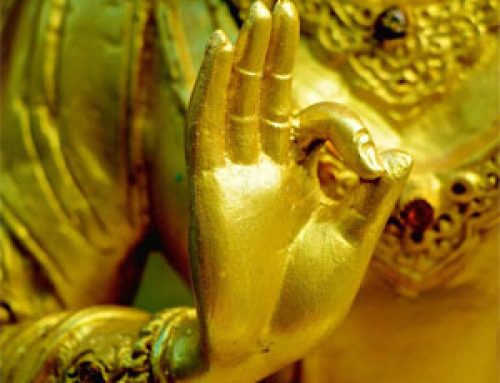A Do-It-Yourself Approach to Happiness
This is the sixth in a 9 part series on learning to practise Buddhism:
Part 1 | Part 2 | Part 3 | Part 4 | Part 5 | Part 6 | Part 7 | Part 8 | Part 9
Patience
The Sixth Perfection in Buddhist practice is patience or khanti in Pali.
The Wikipedia’s Online Dictionary says:
Patience is the ability to endure waiting, delay, or provocation without becoming annoyed or upset, or to persevere calmly when faced with difficulties.
If we consider the word ‘patience’ it may bring the memory of some time in our life when we had to endure some difficulty which was beyond our control. For us, at that time, it may have seemed like an internal battle of making a sustained effort and struggling to withstand the burden of the difficulty.
Maybe that was all you could do at the time to deal with the problem you were facing however, whilst you did succeed in persevering, the thing you were practicing then, from a Buddhist point of view, was not true patience. What you had which made the endurance so difficult was a lack of patience.
True patience from a Buddhist point of view is not just will power or determination to not give up. Probably these attitudes could better be termed endurance or determination. True patience is a peaceful, unshakable mental state which abides in understanding about the nature of the difficulties and unpleasant circumstances which are happening. Patience has knowledge that the unpleasant events which are arising for ourselves or others, are arising from the wrong causes we made in the past, or not enough of the right causes made by us in the past.
Master Hsing Yun writes:
True patience requires no energy. If you have to expend energy to remain patient you can be sure your patience will not last. Patience is found in resting in the spaces between thoughts. Patience is calm and non-judgmental. It is humble and wise in that it does not expect to be first or to have everything go its own way all of the time. (Hsing Yun, 1998)1
Once real patience has been developed it is there in our minds all the time. Those beings who have developed this type of patience live in patience every moment. It is operating even when they are doing things they like to do. It makes those things all the more pleasant and almost effortless.
Master Hsing Yun also quotes the Upasakashila Sutra:
There are two kinds of patience: the patience of this world and the patience which transcends this world. In the patience of this world, we learn to endure hunger, thirst, heat, cold, suffering, and joy.
In the patience which transcends this world we learn to be steady in belief, wisdom, generosity, compassion and open-mindedness. We learn to be steadfast in our loyalty to the Buddha, Dharma, and Sangha and we learn to endure insults, beatings, taunting, evil plots against us, greed, anger, ignorance and all the other vile and humiliating things of this world. We learn to endure the unendurable and to accomplish the impossible. This is what is known as the patience which transcends this world.
Patience is being realistic. It is seeing the world with some wisdom rather than being impatient or angry because the world does not conform to what we want at that moment. Patience does not have the same demands or expectations that the ego has, that I “should” be treated with fairness or kindness, or that people “should” leave me alone when I want, and that people “should not” be rude to me, and so on.
How we are treated is due to our kamma. The ideal we should all be treated equally is a worthy social aim however, in reality, we are each treated uniquely. We are treated according to the kammic causes we made in the past.
What happens if we don’t have patience is that we get upset when we are insulted because our ego belief is that should not have happened to us. We should not be treated like that. Then we have to battle with ourselves to restrain our anger and resentment. With patience the mind sees the conditions of blame arising because of past causes. In most cases there is nothing to be done because the blame is impermanent and will subside by itself.
Patience is above the eight worldly conditions which are:
• Praise and blame
• Honour (respect) and dishonour
• Gain and loss
• Happiness and unhappiness
Patience arises from the wisdom which knows these conditions are driven by our past kamma and are each impermanent. They have no substantial base in themselves, except that they ripen and then pass away from the past causes or lack of the particular causes.
Even intellectually we can begin to learn this new view of patience. What we want is freedom from something, freedom from some unpleasant circumstance, freedom from some pain we are experiencing, freedom from not having what is needed. Patience knows we want to be free of this unpleasant condition, but it realistically accepts we have to work towards that position.
We have to make the right causes first. So we accept that at the moment there is pain, at the moment we have to do the work. We are happy to do the work knowing that it is to some worthwhile purpose – so therefore we don’t get upset or angry.
If we find in our life there is an enduring difficulty we need to identify what causes and actions need to be done to improve our circumstance. We write a plan of actions which are needed to overcome the problem. If we have confidence we have identified the right causes and actions then we just get on with it. We know how to solve the problem so we accept the current unsatisfactoriness knowing that we have addressed it and are doing the actions to fix it. Therefore we can be positive towards our circumstances. If you want to improve faster – make more causes to improve.
Master Hsing Yun Quotes the Patience of Rahula Sutra,
Patience is clear and bright like sunlight or moonlight. The dragon and the elephant are very strong, but even together they do not have a thousandth part of the strength of one who is patient. Common people believe jewels and treasures are the greatest things. They do not see the calamities they cause and the pain. The real, true treasure is patience, for it always assures one of peace and it always treats others well and it always brings the greatest reward. 2
Master Hsing Yun then goes on to enumerate the four benefits or patience, which summarised are:
1. Patience dissipates anger, not only in your own mind, but also in the minds of those around you. “Without fuel, anger cannot burn for long.”
2. Patience is a reliable refuge. Patience can be relied upon in all manner of difficult situations, and can withstand even the most intense sufferings.
3. Patience is the source of great virtue. Although invisible to others, the practice of patience leads to many good qualities such as removing all anger and increasing wisdom.
4. Patience is the source, or cause, of Bodhi wisdom. The Buddha said, “Due to the practice of patience, I have attained Buddhahood and am revered by all worlds. Freely I travel throughout the three realms. 3
Patience comes from living in the present.
In the Bodhicaryavatara (the Guide to the Bodhisattva’s Way of Life) Shantideva says:
There is nothing which remains difficult if it is practiced. So, through practice with minor discomforts, even major discomfort becomes bearable. The irritation of bugs, gnats, and mosquitoes, of hunger and thirst, and suffering such as an enormous itch: why do you not see them as insignificant? Cold, heat, rain and wind, journeying and sickness, imprisonment and beatings: one should not be too squeamish about them. Otherwise the distress becomes worse. (Santideva, 4th C.) 4
Some things require many years’ practice. If we have an unrealistic expectation we will stop before we get something finished. Just like chopping down a tree, if we think the tree should fall each time we chop it then we are unrealistic. We keep chopping maybe many times, and one day we will chop once and the whole tree will fall. Was the last chop the only successful one?
Building a new wholesome mind is like that. When we assemble enough of the right causes then one day we find we have a new mind. Our new mind sees the world slightly differently to our old view, closer to how the Buddha described the world really is.
If we want to buy a new house we know approximately how much it will cost and we know that we can’t have the house until we are able to pay that amount. When we have enough money we can get the house. Getting new wholesome minds requires upfront payment in the form of enough of the right causes. We won’t get the new mind if we only have created half of the causes needed.
From Patrul Rinpoche’s commentary to the Bodhicaryavatara on the Paramita of Patience:
There are various situations that require our patience, beginning with the following four:
When someone treats us with contempt,
Addresses us with harsh words,
Slanders us behind our back,
Or causes us pain.And similarly, when these four are done to our teachers, or our friends and relatives.
Or:
When our enemies and those who oppose us find pleasure and wellbeing,
When they receive honours and rewards,
When they are offered praise,
Or when people speak well of them.5
In addition, there are also situations in which their opposites, the twelve desirable circumstances, are prevented from occurring, making a total of twenty-four opportunities to practice patience.
When any of these occur, avoid becoming disheartened by the events themselves or the suffering they bring, and instead accept the suffering. Do not become angry with those involved, but disregard the harm they do to you. Settle your mind in meditation on the reality of profound emptiness.
There are three reasons for accepting suffering:
- Suffering can exhaust our negative actions, so we should accept it with the understanding that it is like a broom for sweeping away our misdeeds.
- Through suffering we develop renunciation for samsara, compassion for other sentient beings, and a wish to adopt wholesome actions and avoid unwholesome ones. So we should accept it in the knowledge that it spurs us on to virtue.
- Suffering subdues pride, takes away the sting of envy, overcomes the strength of desire and attachment, and leads us on towards accomplishment. So we should accept it with the view that it is an embellishment of the mind.
The patience of disregarding the harm done to us by others can be cultivated for the following three reasons:
- Cultivate patience by seeing those who harm you as objects for compassion. If you think how deluded sentient beings will inflict harm even on themselves through the influence of their mental afflictions, is it any wonder they do so to others?
- Cultivate patience by putting all the blame on yourself. Consider how all the harm that is done to you now must come from your own past karma and how you conduct yourself in the immediate situation.
- Cultivate patience by thinking that it is only with the help of your enemies that you can gain the merit of practicing patience, which in turn becomes a support for Bodhisattva activity. Consider your enemies as friends who actually bring you benefit. (Patrul Rinpoche, 19th c.) 4
Finally you may recognise that as we do our practice of meditation on the breath we can develop causes to have the mind of patience ourselves in the future.
Alan Watts once said:
“Muddy water is best cleared by leaving it alone.”
If we do not disturb our own mind gradually the mud will begin to settle. As we meditate we are training ourselves to accept discomfort of body and mind, training our minds to not stir up our thoughts but rather let them quieten, training to not react to the things we notice but to let them go, training ourselves in patience.
The Sutra in Forty-Two Sections says:
“Where does the greatest power lie?
It lies in patience under insult.
Those who are patient do not feel resentment
and thus they are honoured by all.” 6
References
- Master Hsing Yun. 1998. Being Good, Buddhist Ethics for Everyday Life with permission by Buddha’s Light Publications, USA. Published September 2009 Translated by Tom Graham
- Master Hsing Yun. 1998. Being Good, Buddhist Ethics for Everyday Life with permission by Buddha’s Light Publications, USA. Published September 2009 Translated by Tom Graham
- Master Hsing Yun. 1998. Being Good, Buddhist Ethics for Everyday Life with permission by Buddha’s Light Publications, USA. Published September 2009 Translated by Tom Graham
- Santideva, 4th c. A Guide To The Bodhisattva Way Of Life (Bodhicaryavatara). Translated by Vesna A Wallace and B Alan Wallace. Published by Snow Lion, an imprint of Shambhala Publications, Inc. Horticultural Hall, 300 Massachusetts Avenue, Boston, Massachusetts 02115. 1997
- Patrul Rinpoche, 19th c. Santideva. Sun of Brilliant Clarity, A Step-by-Step Guide to Meditating on the Bodhicaryavatara. Translated by Adam Pearcey. Published online at www.lotsawahouse.org. Reprinted with exemption as material is in the public domain
- Master Hsing Yun. 1998. Being Good, Buddhist Ethics for Everyday Life with permission by Buddha’s Light Publications, USA. Published September 2009 Translated by Tom Graham



